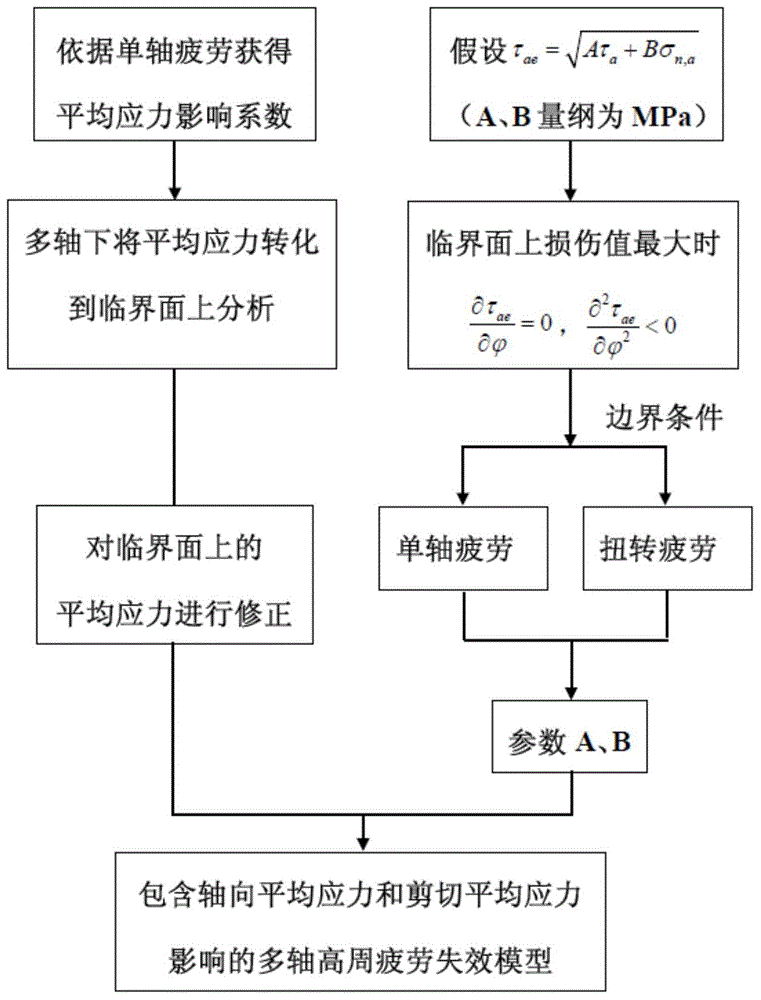Prediction method of metal material multiaxial high cycle fatigue failure including mean stress effect
A mean stress and fatigue failure technology, applied in the direction of analyzing materials, measuring devices, special data processing applications, etc., can solve problems such as lack of physical background, difficulty in determining parameters, and complex determination of critical surfaces
- Summary
- Abstract
- Description
- Claims
- Application Information
AI Technical Summary
Problems solved by technology
Method used
Image
Examples
Embodiment 1
[0085] Example 1: Prediction of high-cycle fatigue life and fatigue crack angle of 2A12-T4 aluminum alloy under combined tension-torsion loading
[0086] Such as figure 2 As shown, it is a schematic diagram of the dimensions of the 2A12-T4 aluminum alloy tensile and torsion test specimen, and its uniaxial fatigue performance is: b=-0.0687, the pure torsional fatigue performance is: b γ =-0.1094. Loads were applied to the test piece under different axial average stresses to obtain the tensile-torsion fatigue test life of the test piece.
[0087] 1. Because the size of the fatigue test piece is designed according to the national standard, the stress during the tension-torsion fatigue loading process can be obtained by the exact solution. The loading force of the test piece in the test is as follows: Figure 5 As shown in a, bearing axial fatigue load Fx and torsional fatigue load Mxy, the stress analysis is as follows Figure 5 As shown in b, the symbol system of elastic...
Embodiment 2
[0093] Example 2: Prediction of high-cycle fatigue life and fatigue crack angle of 30CrMnSiA steel under combined tension-torsion loading
[0094] Such as image 3 As shown, it is a schematic diagram of the size of the 30CrMnSiA steel tensile torsion test specimen, and its uniaxial fatigue performance is: b=-0.0585, the pure torsional fatigue performance is: b γ =-0.0856. Loads were applied to the test piece under different axial average stresses to obtain the tensile-torsion fatigue test life of the test piece.
[0095] 1. Because the size of the fatigue test piece is designed according to the national standard, the stress during the tension-torsion fatigue loading process can be obtained by the exact solution. The loading force of the test piece in the test is as follows: Figure 5 As shown in a, bearing axial fatigue load Fx and torsional fatigue load Mxy, the stress analysis is as follows Figure 5 As shown in b, the symbol system of elastic mechanics is adopted;
...
PUM
 Login to View More
Login to View More Abstract
Description
Claims
Application Information
 Login to View More
Login to View More - R&D
- Intellectual Property
- Life Sciences
- Materials
- Tech Scout
- Unparalleled Data Quality
- Higher Quality Content
- 60% Fewer Hallucinations
Browse by: Latest US Patents, China's latest patents, Technical Efficacy Thesaurus, Application Domain, Technology Topic, Popular Technical Reports.
© 2025 PatSnap. All rights reserved.Legal|Privacy policy|Modern Slavery Act Transparency Statement|Sitemap|About US| Contact US: help@patsnap.com



